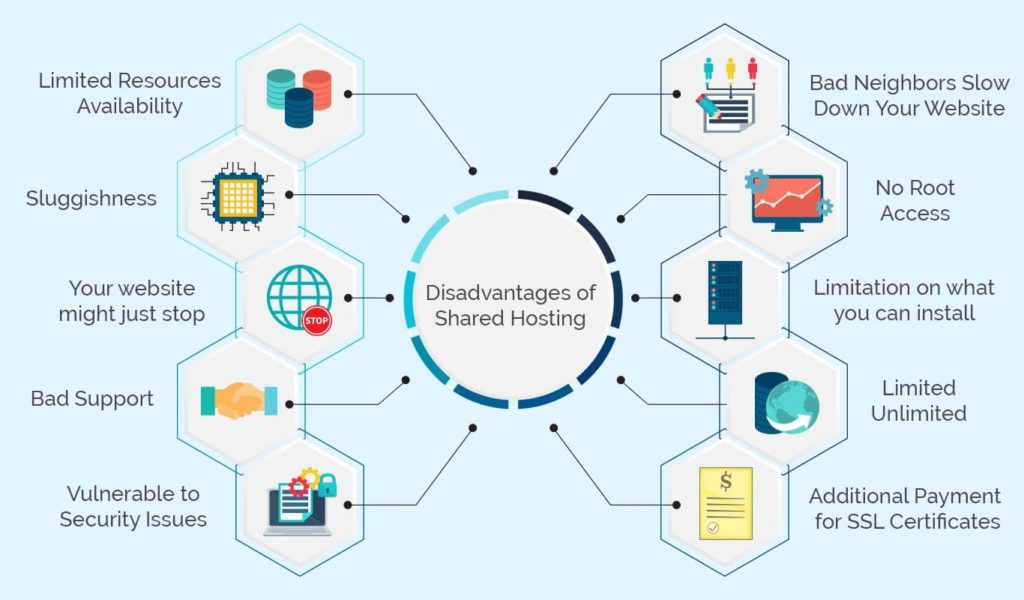If you thought shared hosting was godsend, then prepared to be disappointed, as we are going to talk about disadvantages of shared hosting.
When you are trying to setup a small business website and start looking for hosting, you invariably come across great-looking shared hosting plans. These plans look feature rich, very cheap, and are just everywhere. It becomes very easy to be tempted to buy into shared hosting and host your small business website on that.
But sooner, rather than later, you realize something is just not right. Your website slows down for no reason, things stop working without a warning, and support is not what it was advertised to be.
That is the truth of shared hosting.
A shared hosting looks great at the beginning, but can become the biggest reason that your small business website is not able to get you new customers; which was the main reason you setup your website.
In this article, we will list 10 disadvantages of shared hosting and why small business websites should stay away from shared hosting, even though other options are a bit more expensive.
Before we get there, let’s try to get a better sense of what Shared Hosting is. And to be fair to shared hosting, we will list down some of its advantages as well.
What is Shared Hosting?

As the name implies, Shared hosting is a hosting in which you share resources with other websites.
Basically, a big server is setup by your web hosting company and then a lots of websites are setup on the same server, sharing the same resources (processor, RAM, storage, network bandwidth). A typical shared hosting server could be hosting hundreds of websites, if not thousands.
Yep, hundreds.
Your website could be on same server which has hundreds of websites, all fighting for same set of resources. Let that sink in for a minute.
What are Advantages of Shared Hosting?

Despite all the disadvantages of Shared Hosting, it has many advantages as well, which make it so popular.
Very Cheap:
The main reason most of the businesses end up with shared hosting is the low cost associated with it. A shared hosting could start at just a couple of dollars a month, with companies like Hostgator, Bluehost, and GoDaddy being the kings of this market. However, this advantage is quickly wiping out as the VPS servers are becoming almost equally cheap, starting just $5 a month. Companies like Digital Ocean, Linode, and Amazon Lightsail are the preferred choices for this.Very Easy to Setup:
Getting started on shared hosting is really easy. Most of the shared hosting companies come with one-click WordPress install, one-click email setup, and built-in DNS management. So, you literally can be done in just a few minutes.Easy Support:
Shared hosting companies provide easy support options, with some also providing phone based support. However, the quality of the support that you receive can be an entirely different story.These are the factors that entice most of the small businesses towards shared hosting. However, Shared hosting has more disadvantages that advantages and there are solid reasons why our website management company recommends small businesses to stay away from shared hosting.
Disadvantages of Shared Hosting

Shared hosting has a lot more disadvantages than advantages. Let’s walk you through them.
Limited Resources Availability:
As you would have garnered by now, your website gets to use very limited resources on shared hosting. So, if you try to add some resource intensive functionality to your website, you may be out of luck.Sluggishness:
One of the complaints we hear most often from Small Business Owners is that their websites feel sluggish and often times they blame their website for it. However, it is primarily because of lack of resources that are available on shared hosting that stop your website from performing to its full potential.On Busy days, your website might just stop:
To avoid a single website from overusing server resources, shared hosting companies put controls in place to start killing processes if a website starts using more resources. What this means for you is that if suddenly your website becomes popular (like, it got mentioned on some other website, or some influencer talked about it) and starts getting a lot of traffic, it can actually go down! You will receive warning from your shared hosting web host that your website is consuming a lot of resources, and it might even be suspended. Just look at the irony: you created the website in anticipation that it becomes popular, but when it does, it gets suspended, as if becoming popular was a crime.Vulnerable to Security Issues:
This probably is one of the biggest disadvantage of shared hosting because of which you should just stay away from it. If any website on a server gets hacked, then other websites also come under potential threat. And if the server itself gets hacked, then every website on the server goes with it. So, without a mistake of your own, your website is under risk in a shared hosting environment (to be fair, shared hosting companies do try to isolate websites, but it is not 100% isolation).Bad Support:
Even though shared hosting companies claim to provide easy support, the support itself might not be knowledgeable enough. If your website runs into an issue, they might not be able to help you with that. If it goes down, they will just restart it for you. If you ask why it keeps going down, they might be clueless. And in general, you might soon realize you are talking to someone who is not a WordPress pro, but instead someone who is reading from a prepared FAQ. For any bigger issue, you would have to look for an expert help from outside, which could literally cost hundreds of dollars. This sheer lack of good support is a big disadvantage of shared hosting.Bad Neighbors Slow Down Your Website:
If your website is on a server that has a lot of other websites which get good traffic, then the entire server would slow down, which would in turn slow down your website as well. So, your website won’t just slow down because it became popular; it can also slow down because other websites on your server became popular. Way to go!Limitation on what you can install:
Shared hosting servers provide a limited list of software that you can install on your server. If you need to install anything outside that list, you might be out of luck.No Root Access:
As your website starts becoming popular and more advanced, you will feel a need to get root access to your server. But, most of the shared hosting companies don’t provide that.Additional Payment for SSL Certificates:
Initial cost of shared hosting is low, but as soon as you try to add a feature, you are forced to spend more. A typical example is SSL certificates. Many shared hosting companies don’t provide SSL certificates for free, which cause your website to show “Not Secure” warning. However, these certificates are actually available for free, from companies like Let’s Encrypt. But, you still end up paying for them on shared hosting. And if you add up the cost of buying SSL certificate from shared hosting, the cost itself becomes a big disadvantage of shared hosting.Limited Unlimited:
Shared hosting companies spend tons of money on advertising and one of the features they constantly advertise is “Unlimited everything”. There is no limit on what they can promise to be “Unlimited”: Unlimited storage, unlimited emails, unlimited bandwidths, and whatnot. However, soon you realize that there is nothing that is unlimited. As your email accounts start gathering a lot of emails, the space becomes restricted. As your website starts taking a lot of space, you get warning. And as it starts using a lot of bandwidth, you can just be banned. So, there is nothing really that is unlimited; it’s just false advertising.So, Should you Go with Shared Hosting?
No. Just no. The only real reason small businesses used to end up with shared hosting was the cost, but that is also not a factor anymore, thanks to super cheap VPS introduced by some fantastic hosting companies. On top of that, you don’t want your website to go down as soon as it becomes popular. And you definitely don’t want your website to slow down or be hacked because of some other website.
Even if you are just starting, go with a VPS hosting. Now VPS hosting has become almost as simple as shared hosting and you get dedicated resources that your website can use. If you need a help with that, get in touch.







